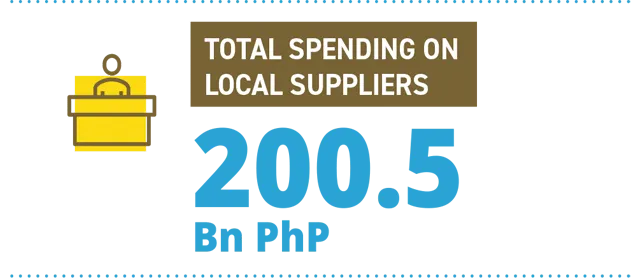Sustainable Supply Chain
It has been said that without the last UN SDG, SDG: 17 Partnership for the Goals, achieving the other 16 goals would be impossible. Forging transformative partnerships and collaborations is vital in unlocking the greatest possible impact from sustainability initiatives. It creates multiplier effects and even makes possible a systems-level reset— feats that can never be achieved by going at it alone.
In San Miguel, we strive to form positive alliances outside the four walls of our business, first within our ecosystem of suppliers. We regard our suppliers as partners in value creation and work with them in full trust and transparency. We believe that a genuine alliance with our suppliers will help us tackle industry-wide challenges, innovate, and test new technologies together, and overall find opportunities to improve lives.
To form a truly beneficial partnership, our suppliers and we help each other elevate our individual sustainability journeys by instituting initiatives that inculcate ethical and sustainable practices in our end-to-end supply chain.
Supporting Local Businesses
As one of the Philippines’ largest and most diversified conglomerates, we have more than 100 major facilities all over the country and the Asia Pacific. As such, we need a steady and reliable supply of raw materials and services for our businesses to run optimally.


In 2022, we spent 53% of our total procurement budget on local businesses, representing 200.5 billion PhP in local spending. By sourcing locally, we hope to provide a big boon to the local economy, especially to our host communities and our fellow Filipinos. We intend to build capacity at the grassroots level and create more partner businesses that will grow and thrive with San Miguel. Lastly, by tapping local suppliers, we aim to help the environment through reduced emissions and energy usage by eliminating shipping and storage associated with importation.
On Course for a Fully Ethical and Sustainable Supply Chain
To succeed in building a more sustainable supply chain, we have laid the groundwork for corporate governance in our procurement practices. We have established a group-wide Procurement Policy Manual that promotes the adoption of good governance principles among our suppliers and advances ethical principles throughout our supply chain. Our Corporate Procurement Group centrally manages supplier accreditation for all our business units, except for Petron, which separately manages its supplier accreditation. Our supplier processes ensure superior quality, cost efficiency, and timeliness of delivery of materials and services to our various facilities.
More recently, in 2022, we took the opportunity to further embed ESG principles in our supply ecosystem by enhancing our Supplier Code of Conduct. The updated Code of Conduct underlines our strong commitment to doing business in an ethical, legal, and environmentally and socially responsible manner. It applies to all our suppliers, personnel, agents, subcontractors, and entities engaged by our businesses to provide goods and services.
Apart from addressing compliance with antibribery, anti-fraud, data privacy, and fair-trade standards, our Supplier Code of Conduct has enhanced sections on environmental, occupational health and safety, and labor practices.
On environmental practices, we ask our suppliers to continually look for ways to minimize consumption of energy and resources and the generation of GHG emissions and waste in their businesses. We also require them to comply with environmental laws and regulations applicable to their operations worldwide.
On occupational health and safety, we urge our suppliers to provide a safe and healthy working environment for all their employees that includes appropriate training, a system for reporting injury and illness, medical treatment for any injuries sustained at work, and clean and safe facilities. Furthermore, we mandate our suppliers to comply with all relevant local and national laws and regulations such as DOLE’s OSH requirements.
On labor practices, we expect our suppliers to treat their workers fairly and with respect and dignity. Our suppliers must comply with laws on forced labor, child labor, human trafficking and slavery, and minimum wage, to name a few. We also encourage our suppliers to exercise due diligence in selecting their own suppliers and subcontractors in order to ensure responsible sourcing throughout the supply chain.
The Supplier Code of Conduct is an important element of our supplier accreditation process. We ask our suppliers to study and agree to the Code of Conduct as a pre-requisite to registration. By virtue of this, no suppliers of SMC were identified as having significant risk of incidents related to child labor or exposing young workers to hazardous working conditions in 2022.
In San Miguel, we strive to form positive alliances outside the four walls of our business, first within our ecosystem of suppliers. We regard our suppliers as partners in value creation and work with them in full trust and transparency.
Going forward, we will request our suppliers to fill out a sustainability checklist, which is a comprehensive questionnaire on social accountability and environmental management.
To read more about our Procurement Policy Manual and Supplier Code of Conduct, please visit SMC’s company website: https://www. sanmiguel.com.ph/page/company-policy.
Achieving a fully ethical and sustainable supply chain is a journey and demands constant engagement with our suppliers. In 2022, we conducted an initial engagement with the top 20 suppliers of each of our business units to survey their ESG performance, a total of 263 unique suppliers in all, accounting for 18% of spend. It is noteworthy that more than 52% of 188 respondents have external certifications such as ISO 14001: Environmental Management Systems.
In the coming years, we intend to do more. For 2023, we have set a target of over 500 suppliers (all top suppliers of SMC and accounting for over 50% of the total procurement spend) with whom we will have regular dialogues on ESG to help raise their sustainability performance for everyone’s collective benefit.

